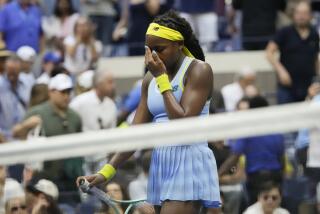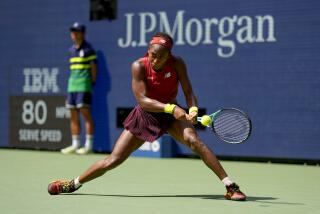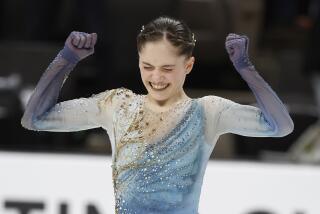Garrison Almost Throws Away First Victory Over Navratilova
- Share via
NEW YORK — This will be the first time since 1980 that Martina Navratilova has gone dry--as in not winning a Grand Slam singles title--so she turned to water to explain her thoughts on the matter.
“You know the saying, ‘If today was a fish, I’d throw it back in?’ ” she said. “If this year was a fish, I’d throw it back in.”
For Navratilova, the two-time defending champion, her year ended in a wash when 11th-seeded Zina Garrison of Houston defeated her in the U.S. Open quarterfinals Wednesday at the National Tennis Center in Flushing Meadow, 6-4, 6-7, 7-5.
Garrison had played Navratilova 21 times before and was 0 for 21. She had managed to win just two sets in those meetings.
And Wednesday, Garrison, 24, came ever so close to giving away her victory, coming back to win after squandering five match points.
Even Garrison herself had thought this time wouldn’t be any different from the other 21.
“Naturally, I was already thinking about going home on the next flight,” she said, smiling. “That’s just being realistic. Now, I have a 1 behind the 21, so I feel really good.”
Said Navratilova: “I’m happy for Zina because she’s come close a few times and played very good matches against me and I’ve always turned her back. It’s just too bad for me that it had to happen here. She is too good of a player to have never beaten me. I’ve always said that. It’s just unfortunate that it happened today at the U.S. Open.
Garrison was up, 6-4, 5-0, a seemingly invincible lead, when things started to slip. They continued to slip, too, until Navratilova redirected the match back Garrison’s way.
Navratilova had fought back to 5-5 in the third and even staved off four match points in the second. But then she started missing her trademark, the high backhand volley, in the latter stages. She led 30-0 on her own serve in the 11th game before losing the next four points.
Finally, Garrison clinched it--yet, needed two more match points to do it in the 12th game--with a low, forehand-volley winner.
What Navratilova’s loss does to this year’s U.S. Open women’s field is leave the door wide open for 19-year-old Steffi Graf to win her final leg of the Grand Slam here. Navratilova, who pushed Graf to three sets in the Wimbledon final, was really the last significant threat to stop the young German’s Slam.
Left to do the job are Garrison, Chris Evert or Gabriela Sabatini. A look at their chances: --Garrison. This will be her first time in the U.S. Open semifinals and she’ll play Sabatini Friday. She will have her hands full with Sabatini, let alone Graf, as she has lost to the Argentine in four of their last five meetings.
--Evert. She struggled against No. 6 Manuela Maleeva, winning in another quarterfinal match, 3-6, 6-4, 6-2. Also, the 33-year-old Evert has not beaten Graf since 1986. Graf has won their last six meetings. They meet again Friday.
--Sabatini. The 18-year-old player didn’t exactly look convincing with her close victory over Stephanie Rehe in the fourth round, or against Soviet Larisa Savchenko Wednesday. Sabatini took advantage of Savchenko’s nerves, rallying to win, 4-6, 6-4, 6-1. Sabatini had never beaten Graf until this year, then did it twice. But she lost in straight sets in their most recent meeting in the French Open semifinals.
Graf, a 6-3, 6-0 quarterfinal winner over No. 14 Katerina Maleeva, has managed to block out all distractions in these last few chaotic weeks. In her five Open matches, the most games Graf has lost in a match is six.
No wonder she has this to say about the tournament: “I’m happy I’m at this stage. For me, it’s more like the tournament is just starting.”
On the same day the ex-champion Navratilova made her premature exit, the new champion talked about getting started here.
Perhaps Garrison, too, is just getting started now, with her arrival in the final four at the Open. Her ex-doubles partner, Lori McNeil, created a stir at the National Tennis Center by defeating Evert en route to the semifinals in 1987. Garrison was asked if there was any special incentive this time because she had lost to McNeil in the Open last year.
“It’s good for both of us,” Garrison said. “That one of us did it in back-to-back years. It will be good when we can do it together.”
Last year, Garrison got emotional when she battled McNeil in a third-set tiebreaker. Despite the occasion, she didn’t get rattled this time against Navratilova despite double-faulting on one match point and doing it twice in the final game.
“I double-faulted so many times that I didn’t worry about it one more time,” said Garrison, almost laughing. “When I got that ace to get to match point again, I felt really good.
“When she hit it to my forehand at the net, I just knew it was a winner.”
The lower part of the men’s draw was filled as two quarterfinals were played Wednesday. No. 2 Mats Wilander, a finalist in 1987, struggled with clay-court specialist Emilio Sanchez of Spain en route to a 3-6, 7-6, 6-0, 6-4 victory.
“He played very well from the beginning and I was a little slow,” said Wilander, who will meet unseeded Darren Cahill of Australia in the semifinals Saturday.
“His forehand is very quick and if you’re not working hard with your feet then you’re going to be one step too late all the time,” Wilander said. “It’s a little bit of luck I was able to get back into the match. It’s hard (for him) to play that well the whole match.”
For Wilander, the match turned when he won the second-set tiebreaker, 8-6, after squandering a handful of set points earlier. After that, Sanchez was visibly tired and Wilander was through to the semifinals for the third time in seven years at the Open.
Cahill found the going much rougher as he needed to go five sets before stopping the 21-year-old Aaron Krickstein of Grosse Pointe Woods, Mich., 6-2, 5-7, 7-6, 5-7, 6-3. Cahill, ranked No. 36 reached the quarterfinals without losing a set, could have put Krickstein away sooner but squandered a set point in the second.
“I really wanted to win the (second) set,” said Cahill, the first Aussie to reach the U.S. Open semifinals since Pat Cash did it in 1984. “I pushed a little too hard, though, when I got a break up in the second.”
He is also the first unseeded player to reach the semifinals here since Johan Kriek accomplished that in 1980. Krickstein, for his part, had never lost a five-set match in the Open before Wednesday, going 6-0. Cahill wasn’t aware of that statistic.
“No, I lost one last year, 7-6, in the fifth and that was what was going through my mind,” Cahill said.
Wilander, a winner at the Australian Open and French Open this year, also had a clear path, at least of seeded players, at those two events. The same thing has happened at the U.S. Open as No. 3 Stefan Edberg, No. 5 Boris Becker and No. 8 Miloslav Mecir were eliminated earlier than expected.
“It’s good for me that the seeds are out, Mecir and Edberg, but there are still some good players left and I’ll have to concentrate really hard,” Wilander said. “That was one of my problems today. I thought I was going to win because I’m ranked higher. In the semifinal, I will have to tell myself it’s not someone ranked No. 20 or whatever in the world. It’s the U.S. Open semifinal and it doesn’t matter who you play.”
More to Read
Go beyond the scoreboard
Get the latest on L.A.'s teams in the daily Sports Report newsletter.
You may occasionally receive promotional content from the Los Angeles Times.











